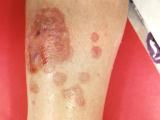Jan 12, 2012
Salmonella outbreak tied to chicken liver declared over after 190 cases
An outbreak of Salmonella Heidelberg infections tied to chicken liver products appears to be over after reaching 190 cases in six states, most of them on the East Coast, the Centers for Disease Control and Prevention (CDC) announced yesterday. The latest count shows an increase of 11 cases since the previous CDC statement on Nov 21. The CDC said the cases include 109 in New York, 62 in New Jersey, 10 in Pennsylvania, 6 in Maryland, 2 in Ohio, and 1 in Minnesota. Among 154 people for whom information was available, 30 (19%) were hospitalized, but no deaths have been reported. The infections have been linked to kosher broiled chicken liver products from Schreiber Processing Corp. of Maspeth, N.Y., which issued a recall on Nov 8. Despite the recall, some of the products may still be in people's homes, the CDC said. Because the Salmonella Heidelberg strain involved in the outbreak is common in the United States, some of the cases counted in the outbreak may not be part of it, the agency noted. But the outbreak strain is different from a Salmonella Heidelberg strain that was found in ground turkey and blamed for a 136-case, 34-state outbreak in 2011, the statement said.
Jan 11 CDC update
ECDC urges caution with TDR-TB label
The European Centre for Disease Prevention and Control (ECDC) said today that the term "TDR-TB" (total or totally drug-resistant tuberculosis) is inexact and should be avoided or defined globally. "Total drug resistant TB is a relative notion and depends on the local drugs available and tested on. This term/expression should either be avoided or should be defined worldwide," the agency said in a statement. It also said that drug-resistant TB results from inadequate treatment and urged healthcare providers to use the correct multi-drug TB treatment regimen for the recommended period. The ECDC further underscored the importance of using optimal diagnostic methods. Late last week researchers in India reported what they described as 12 cases of TDR-TB, which were resistant to 12 drugs.
Jan 12 ECDC statement
Fatal Minnesota infection shows pathogenic ameba has moved north
A fatal case of meningoencephalitis in a Minnesota child in 2010 shows that a type of ameba historically confined to the southern United States can now be found much farther north, according to a report in Clinical Infectious Diseases. Minnesota Department of Health officials reported that the child, a 7-year-old, died of rapidly progressive meningoencephalitis after swimming in lakes and a river in the Minneapolis-St. Paul area. On the basis of amebae identified in cerebrospinal fluid, primary amebic meningoencephalitis (PAM), which is caused by Naegleria fowleri, was suspected. The investigators collected water and sediment samples from places where the patient had swum in the 2 weeks before getting sick. Tests of the samples and of brain samples from the patient revealed N fowleri. The report says surface water temperatures when the environmental samples were collected ranged from 22.1º to 24.5ºC (71.8º to 76.1ºF), and the average air temperature in the area in August 2010 was 25º C (77º F), which was 3.6º C above normal. "This first reported case of PAM acquired in Minnesota occurred 550 miles north of the previously reported northernmost case in the Americas," the report states."
Jan 11 Clin Infect Dis abstract





















